- Home
- S. Hussain Zaidi
Mumbai Avengers
Mumbai Avengers Read online
Cover
Title page
Mumbai Avengers
S. Hussain Zaidi
with
Gabriel Khan
Dedication
For Shabana, Farida, Fatema and Narjis — the four
points of my life compass
Contents
Cover
Title page
Dedication
Foreword
Author’s Note
Prologue
1
2
3
4
5
6
7
8
9
10
11
12
13
14
15
16
17
18
19
20
21
22
23
24
25
26
27
28
29
30
31
32
33
34
35
36
37
38
39
40
Epilogue
About the Author
Copyright
Foreword
I’ve been attracted to films since childhood, especially those that deal with contemporary times and events that have changed the course of history. Many films in Hollywood do this brilliantly; they pick up events from the past and make parallel moving narratives that have some connect to it.
S. Hussain Zaidi is a writer who needs no introduction. He’s known to churn out one best-seller after another and this book has all the elements, despite of it being his first foray into fictional writing inspired by true events. Hussain takes real events and retells them in print, which makes for a compelling read. This time, he has stepped out on another mission and skilfully blended fact and fiction to produce an adept, gritty thriller.
As it happened, Hussain and I were discussing another idea for a possible project, when he brought up the tentative idea of Mumbai Avengers. What he offered me was really exciting to turn into a film. It was right up my alley. It clicked with me instantly, since I’ve been a documentary film-maker as well, and have researched extensively in the genre relating to terrorism – be it in Kashmir or Afghanistan. I have also made three feature films (Kabul Express, New York and Ek Tha Tiger), which in varying degrees, pertain to similar subjects. I lapped up Hussain’s idea in the blink of an eye.
What made his plot more interesting is that it is a fine blend of fact and fiction, or as publishers put it, ‘faction’. Hussain took factual instances and expanded on them wonderfully to form a rather interesting narrative, something which is plausible enough to happen in real life as well. I place a certain confidence in the facts Hussain states, since he is known to be diligent in the background and research for his books. His work has always attracted me, one of the reasons being his cinematic style of writing. That was a major asset he brought to the table in my collaboration with him.
Another aspect that really attracted me to the idea was its backdrop – India after 26/11. Not much has been done in print or film with 26/11, and even today, that red letter day is a provocative and disturbing reminder to every Indian. Many aspects of the horrific attacks are still unresolved. We are still grappling with many questions, and wondering why nothing of note is happening about them. I felt that if you could use a backdrop such as this, and provide a sense of catharsis to Indians, there would be some form of closure, even if in a parallel, fictional world. For instance, the killing of Osama bin Laden in Abbotabad provided a perfect sense of closure for Americans after 9/11. In this book and in my film, Hussain and I have tried to recreate that similar feeling for our countrymen.
Of course, there are differences in my screenplay and in Hussain’s narrative that unfolds in the following pages. There are some things that work well in literature but perhaps not in cinema, and vice versa. Moreover, even though the seed of the idea has come from Hussain’s book, we have both taken separate routes to reach the same finish line. This has also been done so that neither the book nor the film loses its novelty. I’m sure both our approaches to the same idea will leave you thrilled and entertained.
All in all, what Hussain brought to me was an extremely exciting package and it didn’t take me more than a second to grab it. It shouldn’t for you, either.
—Kabir Khan
Author’s Note
Mumbai Avengers has been a sentiment, a dream and an ambition, especially in the post-26/11 scenario. It irks me that our cunning neighbours have always had an upper hand in proxy wars and that our government has often manifested its chronic impotence.
‘We are in an age of asymmetrical war. No longer do vast armies of ill-trained conscripts confront each other in huge and, hopefully, decisive battles,’ writes Nigel Cawthorne in his investigative book Warrior Elite. ‘What is required are small forces of highly trained fighters.’ In other words, a phenomenon which is accurately interpreted by the US, Israel, China—and even Pakistan—but not by India, which is among the most threatened nations in the world.
This book was brewing within me for years but it was only when I met Kabir Khan informally, and we got talking about stories, that it got the much needed impetus.
Mumbai Avengers became possible only due to the dedicated and selfless contribution from some of my friends. As always, doing research for a book and writing it turned into a journey that led to profound discoveries along the way.
The biggest contribution came from my friend, Additional Commissioner of Police Brijesh Singh, who is much younger than me, but whose expertise, skill sets and magnificent understanding of the world are refreshingly exhilarating. Had it not been for him, the book would never have come into existence. I am also thankful to him for reading the manuscript overnight and making several corrections.
Two young and creatively gifted protégés ensured that the book got off beyond the thinking pad – Aditya Iyengar, who was involved at the beginning, and Bilal Siddiqui, who stepped in to fill his shoes. Without their contribution, the book would never have seen the light of day.
Nashik Police Commissioner Kulwant Kumar Sarangal shared his ideas about how one could enter Pakistan. He gave me several hours of his precious time and explained to me the intricacies of espionage operations – pearls of wisdom which are spread through the book.
Apart from the police, S.P.S. Basra from the coast guard was also very helpful. He explained to me the treacherous waters that lay between Karachi and Mumbai.
Retired colonel Mahendra Pratap Choudhary helped me immensely with his profound knowledge of explosives and weaponry. A couple of meetings with him and I felt like an Ayatollah on arms and ammunition. Thank you, Choudhary sahib.
Some intrepid journalists also chipped in with their help. Ateeq Shaikh, special correspondent at DNA and Sagnik Choudhary at Indian Express were among those who helped provide touches of realism to the story. Ateeq’s contacts with the coast guard and fishermen in Mumbai formed the basis for the final escape plan of the Avengers. Sagnik dug into the Indian Express archives to trace the famous story of the victory of Muslim commandoes on the treacherous peaks of Kargil. Sonia Thomas who recently graduated from St. Xavier’s, helped me in the transcription of certain chapters.
Then there were those who agreed to read the manuscript and point out any factual errors in the story. Mrs Anjali Kale-Singh took time to read and draw my attention to a few gaffes. I must thank Major General (Rtd), Sayed Javed Jafri, who not only read the book but also made several corrections. I owe a major debt of gratitude to
Jaspinder Singh Kang, who read the whole story and vetted certain sensitive portions.
Mr Rakesh Maria was the first person to read the first complete draft and give me an endorsement. I cannot thank him enough for his highly encouraging testimonial that adorns the cover of the book.
I must also thank my editor at HarperCollins India, Karthika V.K., a good friend more than just my publisher. Her consistent motivation and inspiration kept me on my toes and encouraged me to write better. My young friend, Mohsin Rizvi, slogged tirelessly to put together the cover of the book and Bonita Vaz helped us arrive at the perfect design.
My list cannot be complete unless I mention Sajid Nadiadwala, whose interest in the story resulted in the writing of this book. Ashoo Naik, the Tom Cruise of my life—remember Jerry Maguire?—was another driving force. Thanks, Ashoo.
The cherry on the cake has been my association with film-maker Kabir Khan. His insights into international espionage and storytelling were a revelation.
Prologue
24 January 2013 – Joint Parliamentary Committee meet.
The giant screen lit up and after a brief flicker, the images of three men, heavily bearded but without moustaches, flashed onto it.
All the people in the room knew who the three men were. They hated them, loathed them, but it was an impotent hate. They could do nothing about it.
The man standing in front of the screen, his back to them, spoke without turning around. ‘When do we get justice?’
He looked like a grizzled, middle-aged man. Retired Lt Gen. Sayed Ali Waris was actually a few weeks over fifty-eight, with close-cropped hair, a perennial frown and bushy eyebrows, a strong jaw set below thin lips and fierce, flashing eyes. A faded, razor-sharp scar ran down his right cheek to his jaw. He seemed extremely fit and stood erect, his shoulders broad. It was clear, even to the undiscerning, that he’d had military training; nobody could mistake him for anything else, even in civilian clothes.
As Waris turned around, his audience unconsciously straightened up in their chairs, and grew more attentive. When the hero of Operation Blue Star and Kargil spoke, everyone listened, without exception. But as he glared at the assembly, there was only one thing on everyone’s mind: why was he showing them pictures of these wanted terrorists, who were out of their reach and therefore old news?
Waris’s deep voice cut across the room clearly, though he spoke in a tone scarcely above a whisper. He pointed at the three faces one by one. ‘Look carefully at the screen, please. The first man is Sabahuddin Umavi, also known as Chachu. He trained the ten terrorists who attacked Mumbai on 26 November five years ago. He was their supreme commander, and he was the one who operationalized their mission.’
There were nods all around —they knew who he was.
‘Next. Mehmood Azhar. Again, a very well-known face. He was the terrorist we were forced to release during the IC-814 hijacking. God alone knows how many attacks he has orchestrated or contributed to.’
Again, everyone nodded, though clearly wondering where this was going.
‘Finally, Wajid Mir. The handler of the ten terrorists. He coordinated with them throughout the attack, and kept speaking to them directly via satellite phones. You have heard his voice in the recordings we obtained of the conversation between the terrorists at Nariman House and their handlers.’
The Lieutenant General paused to make sure he had everyone’s undivided attention.
‘All of you know what these men have done. What they’re capable of. So I ask you again: when do we get justice?’
A woman sitting in the second row spoke. ‘What do you mean by justice, sir? We have registered a case against them in a Pakistani court. There are charge sheets against these people. Isn’t it clear to everyone? Of course we are pressing for justice! Our government is doing its best.’
Waris smiled grimly. When he replied, his voice was bitter. ‘Oh, politics!’ he spat. ‘Is this your sense of justice, which you announce to the whole world? These men are still alive, and for all purposes, they’re still free. Ask the people if they think that’s justice. Go and ask the woman who lost her husband and only child in the attack. Talk to the man who saw his entire family die in front of his eyes, but has survived and is now reduced to a wheelchair existence. Go and talk to the families of all the 166 people who were shattered in one night. Go tell those people what your sense of justice is. Have you even spoken with any of them? I have.’
A man standing at the back of the room said, ‘What do you mean by justice? How else can we get justice besides doing what we are doing now?’
Waris looked at him. ‘Tell me something. In our … quest for progress, what are we doing? Aren’t we constantly emulating the developed nations? We look at the Americans and the Europeans and the lives of all those who live in powerful, developed countries, and all we want is to do what they do, live our lives like them. We ape them so much that we become empty carbon copies of them. Anyway, that’s another matter. But have I said anything wrong? Don’t we use them as models for ourselves?’
There was silence. No one knew how to answer this maverick army man’s question put to them in this uncomfortably direct manner.
‘We try to imitate these countries that have made their mark on the world. So I ask you – what do you think of America’s sense of justice? Osama Bin Laden killed 3,000 of their people. How did the US reply? They declared war and turned a whole country upside down in search of that one man. No matter what the world said or how they labelled them. They didn’t stop, didn’t balk at anything until they got their revenge. Think of Saddam Hussein. He was alive and procuring weapons of mass destruction, which the US felt was a threat to them. So they sent their entire army in search of those weapons. Even when they didn’t find any, did they stop? No! They didn’t rest until they found the dictator and hanged him in full public view. That is their sense of justice, and everyone knows it.’
There was a stirring in the room. Nobody said a word, however, despite the fact that most of India’s might was concentrated in that room.
The twenty-one people present were all part of a Joint Parliamentary Committee (JPC) instituted by the prime minister of India as was suggested by the chief of the Intelligence Bureau (IB). The JPC had been constituted to figure out what to do with the National Counter-Terrorism Centre (NCTC), and to present it in a good light. Unfortunately, since the idea had been conceived, the NCTC had met with a whole host of troubles, including jurisdiction and turf issues, and the chief ministers of several states were openly opposed to the idea.
The JPC comprised four members from the ruling party and seven from the opposition parties, as well as the chiefs of the IB, the Indian Army, Research and Analysis Wing (RAW), the Navy and National Technical Research Organization (NTRO). There were also a couple of retired military officers and Lt Gen. Sayed Ali Waris was one of them, earning his place because of his extraordinary services to the country. They had met a number of times to discuss how to combat the constant threat of terrorist attacks, but every time the discussions had been directionless and had not brought any clarity. In fact, this was the first time the matter had been put to them so succinctly – and so blatantly.
Lt Gen. Waris continued, ‘There is no point in setting up agency after agency unless we have a clear will to decimate the menace of terrorism. After the Kargil war, we established the NTRO. After the 26/11 attack, we established the NIA. Now we want the NCTC. But what’s the point of all these agencies if we can’t use them to neutralize the threat?’
Nobody dared to interrupt, listening in nearly horrified fascination, almost knowing what the Lt Gen. was going to say next.
‘I say, we follow the US example. Since we ape them in every other way, we should do so in this matter too. Our sense of justice should be the same. To kill these three people in whatever way possible. The government of India needs to devise a way. We have to—’
He was interrupted by the IB chief. ‘But we are a democracy!’ the man spluttered, enraged. �
��We know what the US thinks of democracy. It’s bullshit. We can’t be like that!’
Waris was unperturbed. ‘Check your facts, sir. The US isn’t the only country that does exactly what it wants so as to protect its citizens. Think of Israel. What happened after those athletes were killed at the Munich Olympics? They eliminated each and every person responsible. They’re a democracy; in fact, their democracy is closer to ours than the American system. So why can’t we do the same thing? That’s what justice is. Our citizens should know that whoever attacks us on Indian soil will be brought to book in whatever manner possible. If we can’t do it officially, let’s do it unofficially, off the books.’
The IB chief looked as if he was about to explode. He was joined in this sentiment by the RAW and army chiefs. It was becoming increasingly clear that most of them were completely against the idea.
‘I know it’s a war on terror,’ said the army chief. ‘But what you’re suggesting is blatantly against everything we believe! For God’s sake, man, we signed the Geneva convention!’
The retired army man looked at him quizzically. ‘So are you suggesting we do nothing? Let them go scot-free? Should we let our country become a killing field?’
‘I don’t know, but we can’t do this!’ shouted the home secretary. ’I can tell you right here and right now, I will never support an act of retribution like this. We aren’t like America. They can get away with whatever they want to, but we can’t. And as far as Israel is concerned, you know the situation. They have to survive in the Middle East, and to do so, they have to protect themselves. But we can’t!’
The general nodded. He had expected protest. But this was worse than he’d anticipated; they were all against him. He tried another tack. ‘Very well, sir. If you keep talking about bringing them to justice but not killing them, let’s do that. Let’s bring those bastards back to India. The Mossad did that. They went to Argentina and brought Adolf Eichmann back to Israel. He was tried and hung. See? They didn’t kill the Nazi, they brought him all the way from Argentina to Israel.’

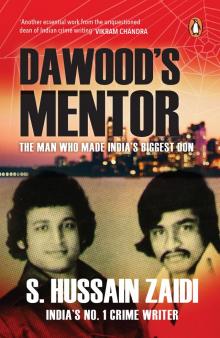 Dawood's Mentor
Dawood's Mentor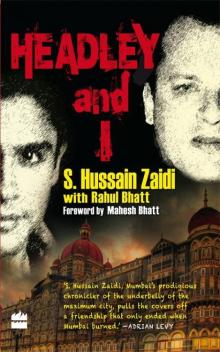 HEADLEY AND I
HEADLEY AND I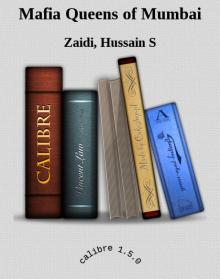 Mafia Queens of Mumbai
Mafia Queens of Mumbai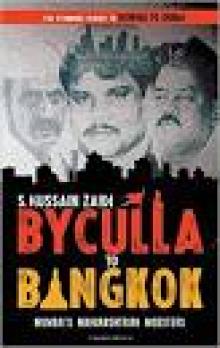 Byculla to Bangkok
Byculla to Bangkok Black Friday
Black Friday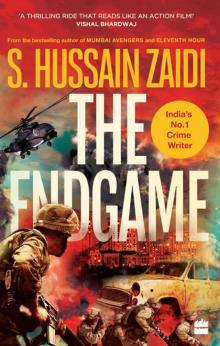 The Endgame
The Endgame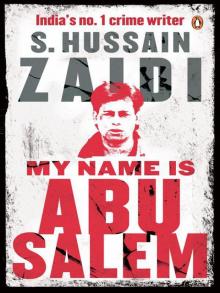 My Name is Abu Salem
My Name is Abu Salem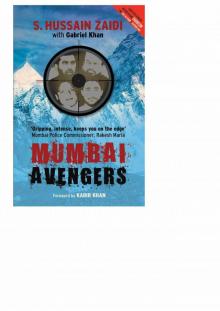 Mumbai Avengers
Mumbai Avengers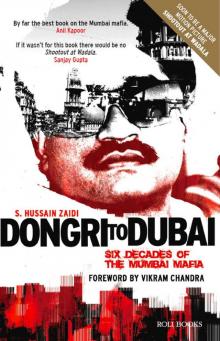 Dongri to Dubai - Six Decades of the Mumbai Mafia
Dongri to Dubai - Six Decades of the Mumbai Mafia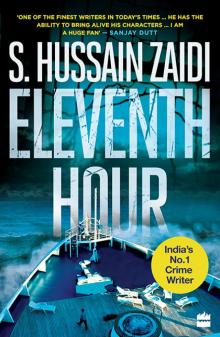 Eleventh Hour
Eleventh Hour